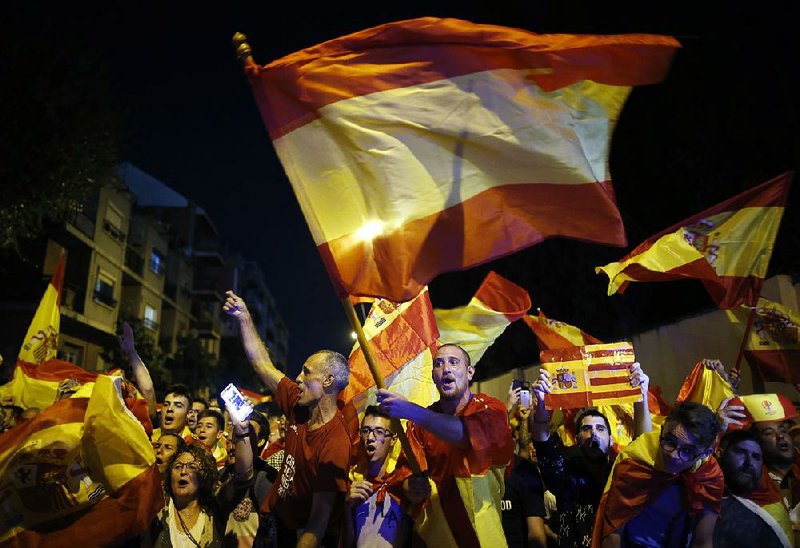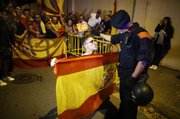BARCELONA, Spain -- Spain's Constitutional Court on Thursday ordered Catalonia's Parliament to suspend a planned session next week during which separatist lawmakers wanted to declare independence.
Catalan regional authorities previously have ignored Constitutional Court orders, so it was not immediately clear whether the session would go ahead and whether all parties would attend.
The court said its order could be appealed but also warned Catalan Parliament Speaker Carme Forcadell and other members of the speakers' board that they could face prosecution for failing to halt the session.
Speaking to reporters, Forcadell called the suspension a "violation of freedom of speech."
"I won't allow censorship to enter Parliament," she said without clarifying whether the meeting would go ahead.
Earlier, Spanish Prime Minister Mariano Rajoy urged the separatist leader of the regional Catalan government, Carles Puigdemont, to cancel plans for declaring independence in order to avoid "greater evils."
In an interview with Spain's official EFE news agency, Rajoy said the solution in Catalonia "is the prompt return to legality and the affirmation, as early as possible, that there will be no unilateral declaration of independence, because that way greater evils will be avoided."
Rajoy's remarks were the first since Sunday, when Catalonia held a banned referendum on independence as Spanish police responded violently. Puigdemont said the results of the vote validated the push to secede.
On Wednesday, Puigdemont called for mediation in the conflict, although he maintained the plan to declare secession next week.
The court order came as political uncertainty over Catalonia's secession bid started spreading to the economy, with stock markets falling and big Catalan firms relocating or considering a move to elsewhere in Spain.
Banco Sabadell, one of Catalonia's largest banks and Spain's fifth in volume of assets, said in a statement to the Spanish stock regulator Thursday that it was relocating the bank's base to the eastern city of Alicante.
News of the possible move pushed the bank's shares up more than 6 percent in Thursday's trading after heavy losses of almost 10 percent this week.
About 40 percent of Catalonia's electorate of 5.5 million voted in the referendum marred by violence when police moved in to close polling stations and confiscate ballot boxes. The yes side scored a landslide victory because most of those who want Catalonia to remain in Spain ignored the referendum that the courts had suspended.
Catalan authorities and the Spanish central government are at odds over the legitimacy of the vote. Spain's 1978 constitution bars any attempt to secede and says all Spanish citizens must have a say in the country's sovereignty.
Catalonia's Parliament called the meeting for Monday to evaluate the results of the referendum. Pro-independence lawmakers say the declaration will be made then.
As the session nears, the clamor for dialogue and mediation in the crisis is gathering momentum although Rajoy's government seems to be sticking to its stance of not talking to those wanting to break up the country.
Barcelona Mayor Ada Colau called on European institutions to consider setting up a task force of experts to mediate after meeting consular representatives of European countries.
Officials in the European Union have called for dialogue but have supported Spain's conservative government in blaming the political crisis on Catalonia's regional government.
Pablo Iglesias, the leader of the Spanish opposition party Podemos, called Rajoy and urged him to seek mediation. But Rajoy insists that Puigdemont must first drop the threat of declaring independence, which was seen by some as a slight easing of his opposition to talks.
Rajoy has been under pressure to act without further tarnishing his image or inflaming separatist sentiment in the region, where a strong cultural identity has mixed with years of grievances for what many Catalans see as an unfair economic treatment of the region, one of Spain's richest.
On Thursday, some of the additional police officers deployed in the region were seen checking out of a hotel in the coastal town of Pineda de Mar in the middle of two sets of protesters -- one side yelling at them to leave and another showing support.
Protests mushroomed after the vote Sunday, condemning police violence and urging the "occupying forces," as many demonstrators have called them, to leave Catalonia.
Many other demonstrations have taken place around the country in support of Spanish unity.
Spain's Interior Ministry said the police departures Thursday had been previously scheduled, as contracts ended with some of the hotels hosting the police reinforcements.
Because of difficulties in finding accommodations on land, some of the more than 5,000 extra police deployed in the region have slept on three ferries docked in Barcelona and nearby Tarragona.
A Section on 10/06/2017

